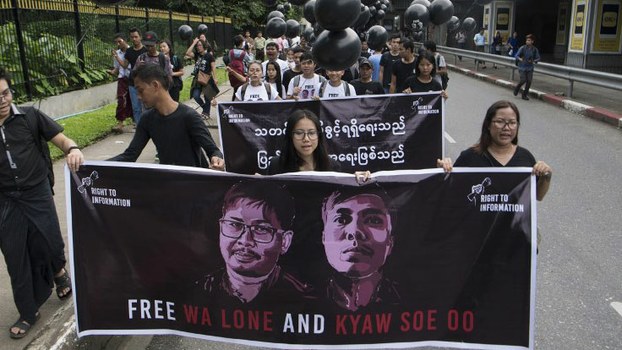




The United Nations human rights office on Tuesday called on Myanmar to end what it called “a political campaign against independent journalism” after a series of cases in which journalists were detained or jailed for doing their jobs.
The U.N. High Commissioner for Human Rights investigated the cases of two Reuters journalists jailed last week for seven years for breaking a law on state secrets, the case of three reporters arrested on unlawful association charges for in June 2017 after covering a "drug burning" ceremony, and other examples in which Myanmar law was used to target journalists.
The 14-page report, titled “The Invisible Boundary–Criminal prosecutions of journalism in Myanmar,” also criticized the "failure of the judiciary to uphold the fair trial rights of those targeted".
“Any arrest and detention of an individual for the peaceful and legitimate exercise of this right constitutes an arbitrary deprivation of liberty and a violation of that person’s right to be free from arbitrary arrest and detention,” said the report.
“Additionally, given the importance of journalism for the public’s right to information, the restrictions imposed on media personnel have a broader implication in society,” it said.
Last week, a judge jailed two Reuters journalists -- both Myanmar nationals -- for seven years under a British colonial era state secrets act over their reporting on the Rohingya crisis, which has seen more than 700,000 of the stateless Rohingya Muslims driven into Bangladesh by a Myanmar army-led crackdown in August 2017.
“While the conviction last week of two Reuters journalists, Kyaw Soe Oo and Thet Oo Maung, was a particularly outrageous and high-profile example of judicial harassment against the media in Myanmar, the report details a number of other examples of detentions and prosecutions of journalists and their sources indicative of wider trends of suppression of freedom of expression,” the UN said in a statement accompanying the report.
“Through such arrests, prosecutions and convictions, the authorities have set an invisible boundary that media personnel cross at their peril, generating a chilling effect on journalism throughout the country,” said the report.
“Despite Myanmar’s transition to democracy, media personnel remain in a precarious position with the right to freedom of expression and the freedom of the press remaining under attack, it added.
UN says drop cases against journalists
The UN rights body said that in situations like the Reuters pair and the drug burning in Shan state, where reporters were carrying out professional duties “the cases should be discontinued in line with rule of law and fair trial principles.”
“There must also be redress for the human rights violations that the journalists have been subjected to through the authorities’ attempts at restricting the freedom of the press,” it added.
UN High Commissioner for Human Rights Michelle Bachelet said the report made clear that independent journalists in Myanmar face great dangers and this is bad for the country’s democratic transition.
“Where journalists are jailed for merely visiting an area controlled by an armed group, when their sources are jailed for providing information from conflict zones, and where a Facebook post can result in criminal defamation accusations – such an environment is hardly conducive to a democratic transition,” she said.
“I call on the authorities to cease the legal and judicial harassment of journalists and to initiate a review of ill-defined laws that facilitate attacks on the legitimate exercise of freedom of expression,” added Bachelet.
The report recommended releasing the Reuters reporters and other jailed journalists “immediately and unconditionally,” and conducting “a review of all legal provisions impacting on freedom of expression with a view to repealing/amending those that do not comply with international human rights law.”
It called for other legal revisions, including making defamation a civil rather than criminal matter, amending the country’s media law to bring it in line with the right to freedom of expression, and discontinuing all current cases against journalists.
'Every point ... is reasonable'
Myint Kyaw, a member of the Myanmar Press Council, told RFA’s Myanmar Service that he thought “every point in the UN report is reasonable.”
“We have been talking about amending the Official Secrets Act since 2013-14, when four journalists and an editor of the Unity Journal were sentenced to 10 years imprisonment with hard labor, also for violating the act,” he said.
“Not only law and acts, but also the judicial system is a problem for Myanmar media. It is not free or fair and is influenced (by authorities) for cases involving the government, military, ethnic armed groups and powerful organizations,” added Myint Kyaw.
There was no immediate reaction from the Myanmar government, headed by de facto leader Aung San Suu Kyi, who has drawn international criticism for not standing up for the Reuters journalists, despite her reputation as a democracy activist.
But Aung Thane, an upper house member of parliament from the ruling National League for Democracy, defended the laws under which the Reuters reporters were jailed.
“It is difficult to do the reform in this situation of our country while having a lot of international pressure,” he told RFA.
“We still need (to keep) some sections or acts that we should have,” Aung Thane added.
“The two Reuters journalists were sentenced to seven years in jail under the Official Secrets Act although they actually faced 14 years imprisonment. Their sentence could be reduced by a higher court,” he said.
“If we abolish this act, we won’t have any act to charge when top government officials violate their ministries or departments’ rules and regulations. This kind of act or similar ones still should exist for people and country’s safety,” said the lawmaker.
Reported by Nay Rein Kyaw for RFA’s Myanmar Service. Translated by Khet Mar. Written in English by Paul Eckert.